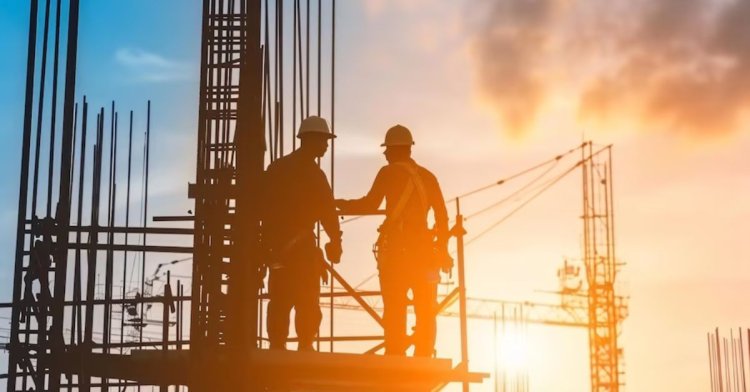How to Choose the Right Civil Contractor for Your Project
Learn how to choose the right civil contractor for your project with this comprehensive guide. Get tips on research, credentials, communication, safety, and more.
Share this Post to earn Money ( Upto ₹100 per 1000 Views )

Selecting the right civil contractor is a crucial decision that can significantly impact the success of your construction project. Whether you are planning to build a new structure, renovate an existing one, or undertake a major infrastructure project, finding a reputable and competent contractor is essential. This article provides a comprehensive guide to help you choose the right civil contractors in Chennai for your project, with a focus on the role of building contractors in the construction industry.
1. Define Your Project Requirements
Before you start looking for a civil contractor, it's important to have a clear understanding of your project's scope, budget, and timeline. Define your requirements in detail, including:
-
Project Scope: Outline the specific tasks and deliverables required.
-
Budget: Determine a realistic budget for the project.
-
Timeline: Establish a timeline for project completion, including key milestones.
Having these details ready will help you communicate your needs effectively to potential contractors and assess their ability to meet your requirements.
2. Research and Shortlist Potential Contractors
Begin by researching potential building contractors in your area. You can gather recommendations from:
-
Industry Networks: Ask for referrals from industry professionals, such as architects, engineers, and other contractors.
-
Online Directories: Use online directories and review platforms to find reputable contractors.
-
Local Building Associations: Contact local building associations or trade organizations for a list of certified contractors.
Create a shortlist of contractors who have a good reputation and relevant experience in your type of project.
3. Verify Credentials and Experience
Once you have a shortlist of potential contractors, verify their credentials and experience. Look for the following:
-
Licensing and Certifications: Ensure the contractor holds the necessary licenses and certifications required by local authorities.
-
Experience: Check the contractor's experience in handling similar projects. Ask for examples of past projects and references.
-
Insurance: Verify that the contractor has adequate insurance coverage, including general liability and workers' compensation.
Experience and credentials are critical factors in determining a contractor's ability to deliver quality work.
4. Check References and Reviews
Contact the references provided by the contractors to get firsthand feedback on their performance. Ask questions about:
-
Quality of Work: Were the clients satisfied with the quality of work delivered?
-
Timeliness: Did the contractor complete the project on time?
-
Budget Adherence: Did the contractor stay within the agreed budget?
-
Communication: How well did the contractor communicate throughout the project?
Additionally, read online reviews and ratings to gain further insights into the contractor's reputation and reliability.
5. Evaluate Communication and Professionalism
Effective communication is key to a successful construction project. During your interactions with potential contractors, assess their communication skills and professionalism. Consider the following:
-
Responsiveness: How quickly does the contractor respond to inquiries and requests?
-
Clarity: Does the contractor provide clear and detailed explanations of project plans and processes?
-
Professionalism: Does the contractor demonstrate professionalism in their interactions and documentation?
A contractor who communicates effectively and professionally is likely to manage your project more efficiently.
6. Review Project Proposals and Estimates
Request detailed project proposals and estimates from the shortlisted contractors. A comprehensive proposal should include:
-
Scope of Work: A detailed description of the tasks and deliverables.
-
Timeline: A timeline outlining key milestones and completion dates.
-
Cost Estimate: A breakdown of costs, including labor, materials, equipment, and any additional fees.
-
Payment Schedule: A clear payment schedule outlining when payments are due.
Compare the proposals to assess which contractor offers the best value for your budget and project requirements.
7. Assess Financial Stability
Ensure that the contractor you choose has a stable financial standing. A financially stable contractor is more likely to complete your project without delays or disruptions. You can request financial references or review financial statements if necessary.
8. Evaluate Safety Practices
Safety is a critical aspect of any construction project. Ask potential contractors about their safety practices and protocols. Ensure they have:
-
Safety Training: Proper safety training programs for their workers.
-
Safety Records: A good track record of safety on past projects.
-
Safety Plan: A comprehensive safety plan tailored to your project.
A contractor who prioritizes safety will minimize risks and ensure a safer working environment.
9. Consider Subcontractors and Suppliers
Many building contractors work with subcontractors and suppliers to complete various aspects of a project. Assess the quality and reliability of the subcontractors and suppliers the contractor plans to use. Ensure they have a good reputation and experience in their respective fields.
10. Trust Your Instincts
Finally, trust your instincts when making the final decision. Choose a contractor with whom you feel comfortable working and who demonstrates a clear understanding of your project goals and expectations.
Conclusion
Choosing the right civil contractor is a critical step in ensuring the success of your construction project. By defining your project requirements, researching potential contractors, verifying credentials, checking references, evaluating communication skills, reviewing proposals, assessing financial stability, prioritizing safety, considering subcontractors, and trusting your instincts, you can make an informed decision. Building contractors in Chennai play a vital role in bringing your project to life, and selecting the right one will help you achieve your construction goals efficiently and effectively.














